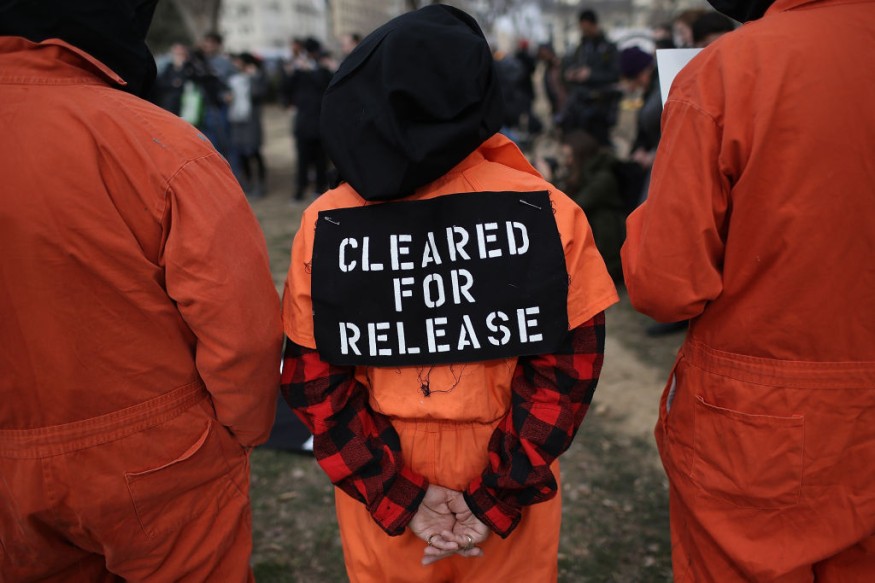U.S. Shuts Secret Guantanamo Prison Unit in Cuba, Moves Prisoners

The U.S. government has closed one of the most clandestine Guantanamo prison units after it had fallen into disrepair.
The U.S. military said Sunday that the detainees at Camp 7 were transferred to Camp 5, a unit adjacent to where the other prisoners are held at the American base in Cuba.
In a statement, the U.S. Southern Command said the move was part of an effort to increase operational efficiency and effectiveness, NBC News reported.
The Miami-based Southern Command did not disclose how many prisoners were moved. But prisoners were without any incident.
Officials did not also disclose when did the transfer take place, according to an Associated Press report. The U.S. Southern Command oversees the detention center in southeastern Cuba.
Among those incarcerated at Camp 7 were five prisoners who were responsible for war crimes and their alleged roles and providing logistical support for Sept. 11 terrorist attacks in 2001.
President Joe Biden earlier said that he plans to close Guantanamo prison. However, that would require approval from Congress to move some prisoners to the U.S. for imprisonment and trial.
Maj. Gregory J. McElwain, a spokesman for the U.S. Southern Command, said the decision to move the prisoners was a "fiscally responsible" one that involved all relevant organizations, including the intelligence community.
McElwain declined to comment on how much the cost of consolidation. He added that Camp 7 will be sanitized, shut down, and locked. However, he noted its final arrangement has yet to be determined.
Guantanamo Prison
The Guantanamo Bay detention camp was initially built to use as a holding facility for Muslim militants and alleged terrorists captured by U.S. forces in Afghanistan and Iraq.
The Guantanamo prison became controversial after claims of violations of the legal rights of the detainees and alleged torture or abusive treatment by U.S. authorities, according to a Britannica article.
The U.S. Supreme Court declared in 2006 that the system of military commissions utilized to try some prisoners held at Guantanamo prison violated the Geneva Conventions and the Uniform Code of Military Justice.
The legality of the commissions was restored by the Military Commission Act in 2006. The said Act also denied the federal courts jurisdiction to hear habeas corpus petitions on foreign detainees.
In 2008, the court overturned the said provision by ruling that foreign detainees have the right to challenge their detentions in federal courts.
Several prisoners who had been cleared for release despite the court's decision continued to be detained. This was due to either no country would accept them or their home countries were deemed too volatile to guarantee their secure imprisonment.
Democratic President Barack Obama ordered the closure of the facility on Jan. 22, 2009.
Yet in 2011, Guantanamo prison continues to operate and houses some post-Sept. 11 detainees who have not been tried for any crimes.
Among the prisoners that were transferred to Camp 5 as part of the consolidation, includes Khalid Shaikh Mohammed, who is accused of being the mastermind for the Sept. 11 attacks, according to a The New York Times report.
James G. Connell III, a capital defense lawyer who represents Ammar al-Baluchi, said the move of the detainees seems to be a solution to "the crumbling Camp 7," adding that the federal government is abandoning it instead of repairing it.
Al-Baluchi is accused of conspiring with his uncle, Mohammed, and three other men in the Sept. 11 attacks. Other best-known captives of the facility include a Palestinian man named Abu Zubaydah, who is held without charges and was the first prisoner to be allegedly waterboarded by the Central Intelligence Agency.
Baltimore-educated Pakistani man Majid Khan was also in the facility. Khan pleaded guilty to serving as a Qaeda courier and was moved from other prisoners.
Reports said the power at Camp 7 sometimes went out and some cell doors would not close and the situation worsened over the summer amid the pandemic since it was hard to bring in contractors and spare parts.
The military has long refused to acknowledge Camp 7's location on the base and has never allowed journalists to see the facility.
WATCH: Will Joe Biden Close Guantanamo Bay? - From Al Jazeera English
Subscribe to Latin Post!
Sign up for our free newsletter for the Latest coverage!
© 2026 Latin Post. All rights reserved. Do not reproduce without permission.













